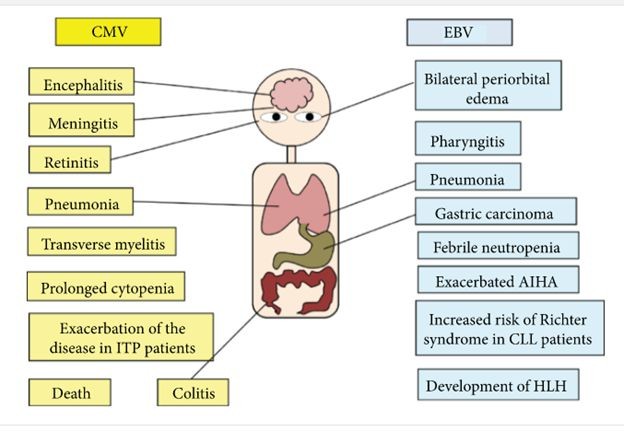
Contents
- 1 Epstein-Barr Virus (EBV)
- 1.0.1 What causes Epstein-Barr virus?
- 1.0.2 Is Epstein-Barr virus contagious?
- 1.0.3 What are the symptoms of Epstein-Barr virus?
- 1.0.4 Diagnosis of Epstein-Barr virus
- 1.0.5 What is the treatment for Epstein-Barr virus?
- 1.0.6 What are the complications of Epstein-Barr virus?
- 1.0.7 What is the prognosis for Epstein-Barr virus?
- 1.0.8 Is it possible to prevent Epstein-Barr virus?
Epstein-Barr Virus (EBV)
The Epstein-Barr virus (EBV) is a member of the herpes virus family (human herpesvirus 4). EBV is found worldwide and is a common cause of viral pharyngitis, especially in young adults. EBV is transmitted from person to person and infects human B cells, which then spread the infection throughout the reticuloendothelial system (RES), which includes the liver, spleen, and peripheral lymph nodes. About 50% of the population has antibodies to the virus by age 5; about 12% of susceptible adults (college-age) develop antibodies to the virus, and half of those adults develop mononucleosis (also known as infectious mononucleosis, mono, glandular fever, or kissing disease), which produces symptoms of swollen lymph nodes, spleen, and liver, fever, inflamed throat, malaise, and rash.
What causes Epstein-Barr virus?
The cause of an Epstein-Barr virus infection or mono is the infection of circulating B cells by EBV and the body’s response to the virus. Risk factors include:
- Intimate contact with body secretions, primarily mouth secretions (including those found in the cervix and semen)
- Youth (children, adolescents, and young adults are most often infected)
- Sharing items like eating utensils, toys, or toothbrushes
- Rarely, blood transfusions or organ transplants
Is Epstein-Barr virus contagious?
Yes, Epstein-Barr virus is contagious and easily transmitted from person to person, primarily through mouth secretions. It can be spread by sharing contaminated objects like cups, toothbrushes, or eating utensils.
EBV is mainly transmitted through saliva during kissing or sharing saliva-containing items (cups, spoons, straws, etc.). Semen and cervical fluid may also contain transmittable EBV. The disease can be subclinical, meaning there are no symptoms, and the virus has rarely been transmitted by blood transfusion or organ transplants. EBV remains in the body for life and can occasionally become reactivated, resulting in symptoms. Reactivated EBV is highly contagious, and a person may be contagious even during the incubation period.
The incubation period for EBV is typically four to seven weeks before symptoms develop.
IMAGES
What are the symptoms of Epstein-Barr virus?
The symptoms of an Epstein-Barr virus infection include:
- Malaise or tiredness
- Fever
- Chills
- Dizziness
- Muscle aches
- Bloating
- Headaches
- Sore throat
- Rash
- Sweats
- Loss of appetite
- Lymph node, liver, and spleen swelling
Symptoms typically last two to four weeks, with tiredness persisting for additional weeks.
Diagnosis of Epstein-Barr virus
EBV infections are often diagnosed based on symptoms. Additional tests are available for confirmation. The U.S. Centers for Disease Control and Prevention (CDC) recommends the following for EBV testing:
CDC recommendations for EBV testing
- Susceptibility to infection: People without antibodies to the viral capsid antigen (VCA) are considered susceptible.
- Primary infection: People with anti-VCA IgM but no antibodies to EBV nuclear antigen (EBNA) are considered to have a primary EBV infection. Other results indicating a primary infection are a high or rising level of anti-VCA IgG and no EBNA antibody after at least four weeks of illness. In rare cases, people with active EBV infections may not have detectable EBV-specific antibodies.
- Past infection: The presence of antibodies to both VCA and EBNA suggests a past infection, which most adults have had. Elevated antibody levels can persist for years and are not indicative of recent infection.
The Monospot test is not recommended for general use by the CDC due to inaccuracies. However, it is still used as a screening test although it is not specific to EBV infection.
These tests can help differentiate EBV infection from other medical conditions like chronic fatigue syndrome or multiple sclerosis.
What is the treatment for Epstein-Barr virus?
There is no specific treatment for EBV, but corticosteroids may be used to reduce tissue swelling. Most treatments focus on symptom relief. Home remedies include rest, fluids, and over-the-counter pain medications (excluding aspirin for children). Avoiding potential trauma is essential since swollen spleens can be easily damaged.
What are the complications of Epstein-Barr virus?
Possible complications of EBV include enlarged spleen, red spots or rash, liver inflammation or swelling, jaundice, anemia, splenic rupture, severe swollen tonsils, breathing difficulties, irregular heartbeat, and a potential increased risk for lymphomas (cancer).
What is the prognosis for Epstein-Barr virus?
Most individuals infected with EBV recover completely without complications. If complications do arise, the majority of patients still recover, although recovery time may be prolonged. Rarely, splenic rupture can occur, which may require surgery and can be fatal.
Is it possible to prevent Epstein-Barr virus?
Currently, there is no vaccine to prevent EBV infections. However, individuals can reduce their risk by avoiding the use of utensils, toys, or other objects used by infected individuals and practicing good hand hygiene. Contact with body fluids, especially saliva, should be minimized. Preventing transmission is difficult due to the pervasive nature of the virus and the possibility of transmission even in the absence of symptoms.
By clicking Submit, I agree to the MedicineNet’s Terms & Conditions & Privacy Policy and understand that I may opt out of MedicineNet’s subscriptions at any time.
United States. Centers for Disease Control and Prevention. "Epstein-Barr Virus and Infectious Mononucleosis." May 8, 2018. [Link].
United States. Centers for Disease Control and Prevention. "Epstein-Barr Virus and Infectious Mononucleosis." May 8, 2018. [Link].


